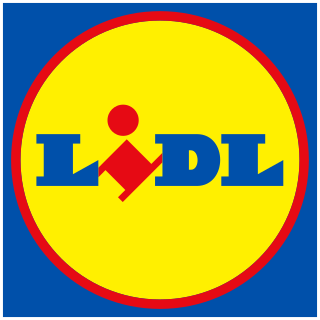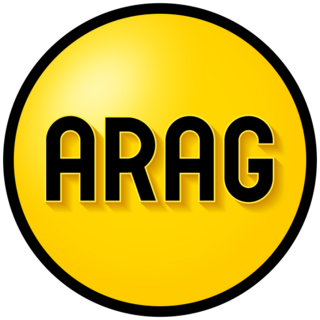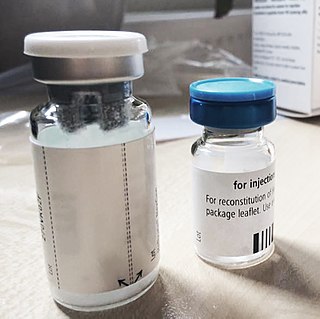Related Research Articles

Siemens AG is a German multinational technology conglomerate. It is focused on industrial automation, distributed energy resources, rail transport and health technology. Siemens is the largest industrial manufacturing company in Europe, and holds the position of global market leader in industrial automation and industrial software.
Sanofi S.A. is a French multinational pharmaceutical and healthcare company headquartered in Paris, France. The corporation was established in 1973 and merged with Synthélabo in 1999 to form Sanofi-Synthélabo. In 2004, Sanofi-Synthélabo merged with Aventis and renamed to Sanofi-Aventis, which were each the product of several previous mergers. It changed its name back to Sanofi in May 2011. The company is a component of the Euro Stoxx 50 stock market index. In 2023, the company’s seat in Forbes Global 2000 was 89.

ThyssenKrupp AG is a German industrial engineering and steel production multinational conglomerate. It resulted from the 1999 merger of Thyssen AG and Krupp and has its operational headquarters in Duisburg and Essen. The company says that it is one of the largest steel producers in the world, and it was ranked tenth-largest worldwide by revenue in 2015. It is divided into 670 subsidiaries worldwide. The largest shareholders are the Alfried Krupp von Bohlen und Halbach Foundation and Cevian Capital. ThyssenKrupp's products range from machines and industrial services to high-speed trains, elevators, and shipbuilding. The subsidiary ThyssenKrupp Marine Systems also manufactures frigates, corvettes, and submarines for the German and foreign navies.

CSL Limited is an Australian multinational specialty biotechnology company that researches, develops, manufactures, and markets products to treat and prevent serious human medical conditions. CSL's product areas include blood plasma derivatives, vaccines, antivenom, and cell culture reagents used in various medical and genetic research and manufacturing applications. The company was established in 1916 as Commonwealth Serum Laboratories and was wholly owned by the Australian federal government until its privatisation in 1994.

Miles Laboratories was founded as the Dr. Miles Medical Company in Elkhart, Indiana, in 1884 by Dr. Franklin L. Miles, a specialist in the treatment of eye and ear disorders, with an interest in the connection of the nervous system to overall health. The company is known for inventing products such as Alka-Selzer and One-A-Day vitamins.

Armour & Company was an American company and was one of the five leading firms in the meat packing industry. It was founded in Chicago, in 1863, by the Armour brothers led by Philip Danforth Armour. By 1880, the company had become Chicago's most important business and had helped make Chicago and its Union Stock Yards the center of America's meatpacking industry. During the same period, its facility in Omaha, Nebraska, boomed, making the city's meatpacking industry the largest in the nation by 1959. In connection with its meatpacking operations, the company also ventured into pharmaceuticals and soap manufacturing, introducing Dial soap in 1948.
Baxter International Inc. is an American multinational healthcare company with headquarters in Deerfield, Illinois.
Jan Moor-Jankowski was a Polish-born American primatologist and a fighter for Polish independence against Nazi Germany. Dr. Moor-Jankowski was Director of the Laboratory for Experimental Medicine and Surgery in Primates (LEMSIP) which he founded in 1965, the Director of the World Health Organization Collaborating Center for Hematology of Primate Apes, and the editor-in-chief of the Journal of Medical Primatology.
ams OSRAM AG is an Austrian semiconductor manufacturer headquartered in Premstätten, Austria with a co-headquarters in Munich, Germany. The company develops and produces intelligent sensors and emitter components

Celgene Corporation is a pharmaceutical company that makes cancer and immunology drugs. Its major product is Revlimid (lenalidomide), which is used in the treatment of multiple myeloma, and also in certain anemias. The company is incorporated in Delaware, headquartered in Summit, New Jersey, and a subsidiary of Bristol Myers Squibb (BMS).
C.H. Boehringer Sohn AG & Co. KG is the parent company of the Boehringer Ingelheim group, which was founded in 1885 by Albert Boehringer (1861–1939) in Ingelheim am Rhein, Germany. As of 2018, Boehringer Ingelheim is one of the world's largest pharmaceutical companies, and the largest private one. Headquartered in Ingelheim, it operates globally with 146 affiliates and more than 47,700 employees. Unlike most large pharmaceutical companies which are listed, the company is private and fully owned by the Boehringer, Liebrecht and von Baumbach families. The company's key areas of interest are: respiratory diseases, metabolism, immunology, oncology and diseases of the central nervous system. Boehringer Ingelheim is a full member of the European Federation of Pharmaceutical Industries and Associations (EFPIA). The corporate logo of Boehringer Ingelheim depicts a stylized rendition of the central section of the imperial palace of Charlemagne.

Regeneron Pharmaceuticals, Inc. is an American biotechnology company headquartered in Westchester County, New York. The company was founded in 1988. Originally focused on neurotrophic factors and their regenerative capabilities, giving rise to its name, the company branched out into the study of both cytokine and tyrosine kinase receptors, which gave rise to their first product, which is a VEGF-trap.
Hikma Pharmaceuticals plc is a British multinational pharmaceutical company with headquarters in London, UK that manufactures non-branded generic and in-licensed pharmaceutical products. It was founded by Samih Darwazah in Amman, Jordan in 1978. It is listed on the London Stock Exchange and is a constituent of the FTSE 100 Index.
Contaminated hemophilia blood products were a serious public health problem in the late 1970s up to 1985.

Waddell & Reed Financial, Inc. was an American asset management and financial planning company founded in 1937 in Kansas City, Missouri. It was a publicly traded company from 1998 to 2021, and briefly had its headquarters in Overland Park, Kansas, and was planning a move back to Downtown Kansas City before the company was sold. It operated asset management and distribution subsidiaries, including Ivy Investment Management Company and Waddell & Reed Investment Management Company.

Grifols, S.A. is a Spanish multinational pharmaceutical and chemical manufacturer. Principally a producer of blood plasma–based products, a field in which it is the European leader and largest worldwide, the company also supplies devices, instruments, and reagents for clinical testing laboratories.

Lidl is a German international discount retailer chain that operates over 12,000 stores, present in every member state of the European Union, Serbia, Switzerland, the United Kingdom and the United States. Headquartered in Neckarsulm, Baden-Württemberg, the company belongs to the Schwarz Group, which also includes hypermarket chain Kaufland.

ARAG SE is a European insurance group. ARAG stands for Allgemeine Rechtsschutzversicherungs Aktiengesellschaft. "SE" stands for "Societas Europaea". Its headquarters are located in the ARAG-Tower in Düsseldorf. The ARAG Group employs almost 4,700 people worldwide. The Group reported total gross premium income of €2.02 billion in 2021. ARAG is the largest family-owned German insurance group, with a legal insurance portfolio of 4.7 million policies in the 2021 business year. The Group's international legal insurance business accounts for 2.9 million policies alone, making it the largest legal insurer in the world. The Group's total insurance business was 12.2 million policies in 2021, 8.4 million of which were outside Germany.

Bayer AG is a German multinational pharmaceutical and biotechnology company and is one of the largest pharmaceutical companies and biomedical companies in the world. Headquartered in Leverkusen, Bayer's areas of business include: pharmaceuticals, consumer healthcare products, agricultural chemicals, seeds and biotechnology products. The company is a component of the EURO STOXX 50 stock market index.

From the 1970s to the early 1990s, tens of thousands of people were infected with hepatitis C and HIV as a result of receiving infected blood or infected clotting factor products in the United Kingdom. Many of the products were imported from the United States, and distributed to patients by the National Health Service. Most recipients had haemophilia or had received a blood transfusion following childbirth or surgery. It has been estimated that more than 30,000 patients received contaminated blood, resulting in the deaths of at least 3,000 people. In July 2017, Prime Minister Theresa May announced an independent public inquiry into the scandal, for which she was widely praised as successive governments going back to the 1980s had refused such an inquiry. May stated that "the victims and their families who have suffered so much pain and hardship deserve answers as to how this could possibly have happened." The final report was published in seven volumes on 20 May 2024, concluding that the scandal could have been largely avoided, patients were knowingly exposed to "unacceptable risks", and that doctors, the government and NHS tried to cover up what happened by "hiding the truth".
References
- ↑ Whiteside, R. M.; Wilson, A.; Blackburn, S.; Hörnig, S. E.; Wilson, C. P. (6 December 2012). Major Companies of Europe 1990/91 Volume 3: Major Companies of Western Europe Outside the European Economic Community. Springer Science & Business Media. ISBN 9789400908017 – via Google Books.
- ↑ Stern, Joe. "In Memoriam of Dr. Otto Schwarz - Plasma Protein Therapeutics Association (PPTA)".
- ↑ "Immuno AG".
- ↑ Thomas M. Burton (30 August 1996). "Baxter Confirms Pact To Acquire Immuno". Wall Street Journal.
- ↑ "Method of producing a factor-VIII(AHF)-high-concentrate".
- ↑ "Final Report: Chapter 23 - Viral Inactivation of Blood Products for Haemophilia Therapy up to 1985".
- ↑ "Abroad at Home; Abusing The Law". The New York Times. 10 May 1991.
- ↑ "IMMUNO, A.G., APPELLANT, v. JAN MOOR-JANKOWSKI, RESPONDENT".
- ↑ Information, Reed Business (21 August 1986). "New Scientist". Reed Business Information – via Google Books.
{{cite web}}:|first=has generic name (help) - ↑ "Baxter Österreich - News & Medien - Pressemitteilungen - 2013 - Gesundheitsunternehmen Baxter investiert in Pharmaproduktion in Krems". 2014-05-06. Archived from the original on 2014-05-06. Retrieved 2022-08-19.